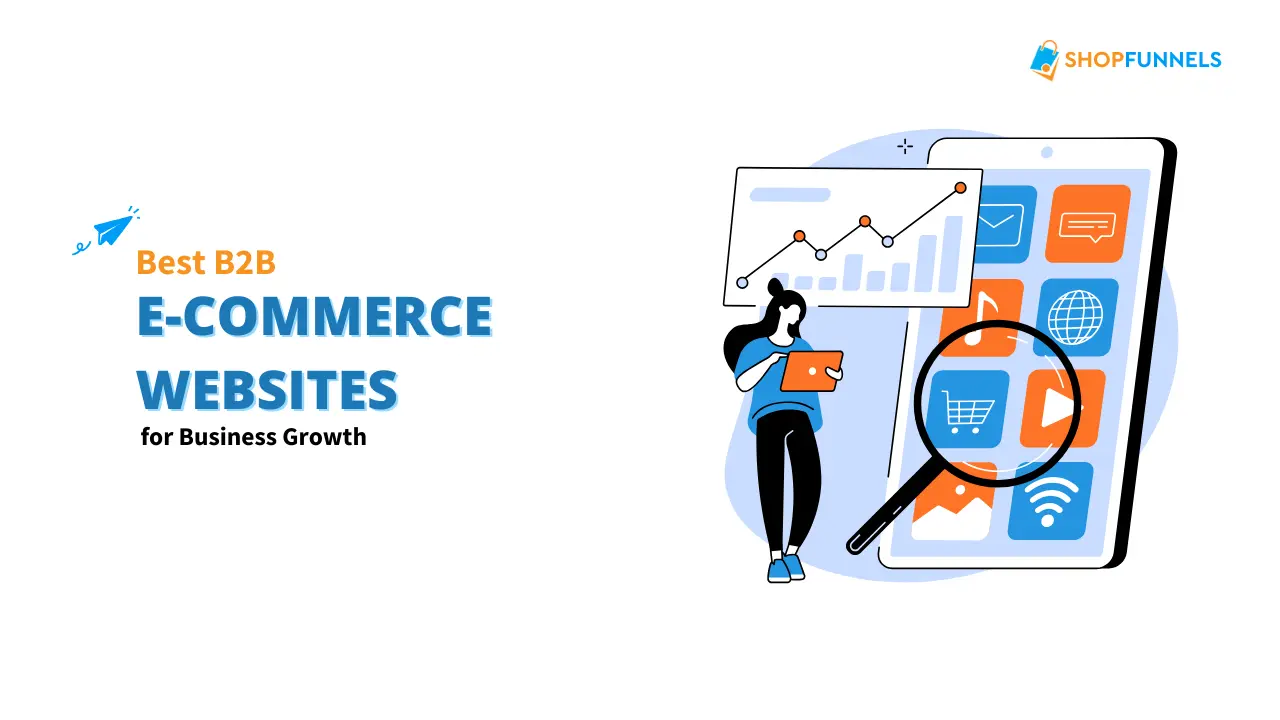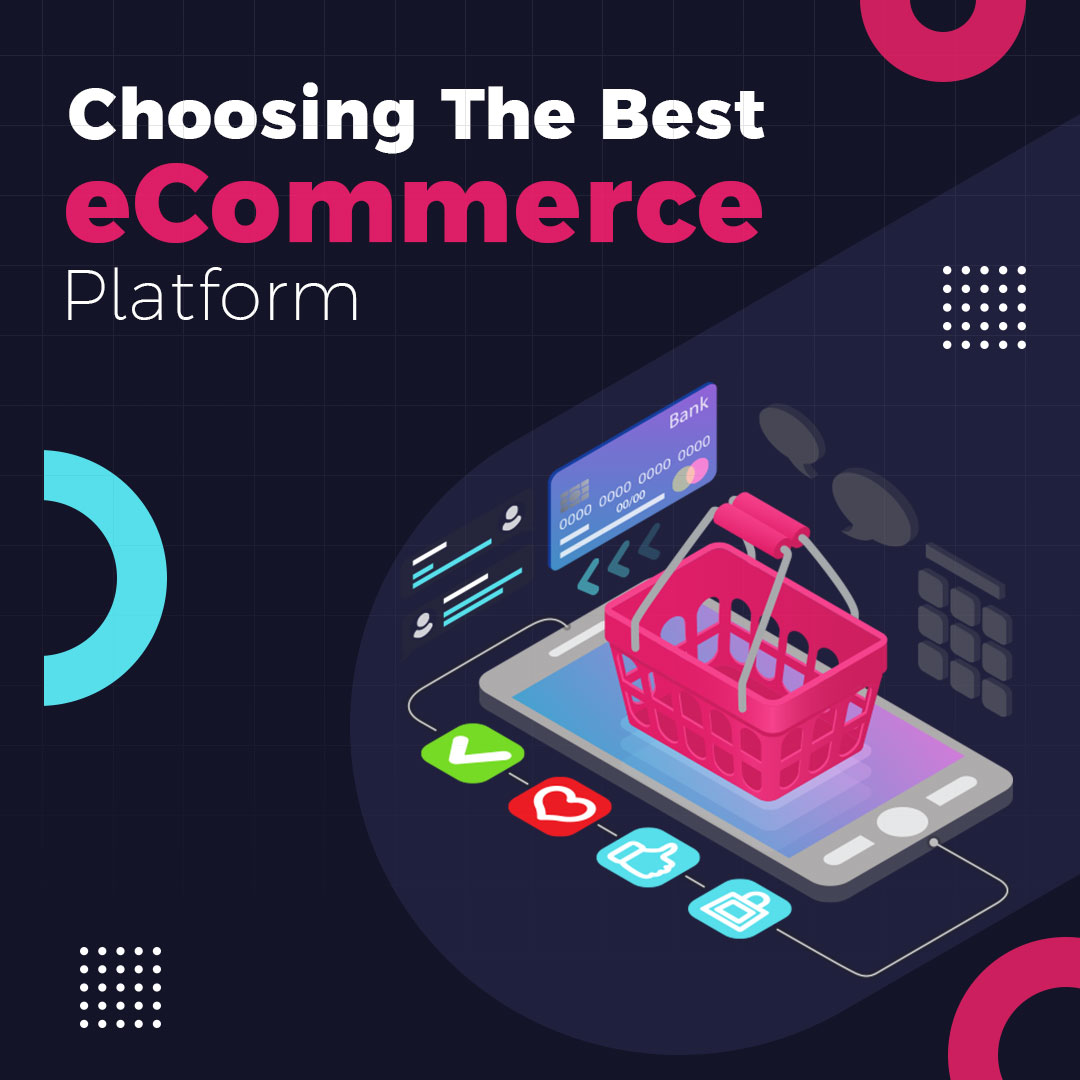E-commerce is rapidly growing, especially for businesses selling to other companies (B2B).
In 2020, the global B2B e-commerce market was worth $14.9 trillion, and it’s expected to reach $25.65 trillion by 2028. This massive growth highlights the need to choose the right B2B e-commerce platform, as businesses that keep up may stay caught up.
In the fast-evolving e-commerce world, B2B e-commerce websites are crucial for helping businesses grow and streamline operations. Unlike B2C platforms, B2B e-commerce focuses on business-to-business transactions involving larger orders, custom pricing, and complex logistics.
As more companies move their operations online, picking the right B2B e-commerce platform is crucial for scaling up, improving customer connections, and entering new markets.
In this blog post, you’ll review the top 12 B2B e-commerce platforms that are leading the way in the industry. You’ll look at their features, benefits, and why they stand out as the best options for B2B businesses.
What Are B2B E-commerce Platforms?
A B2B e-commerce platform is an online tool made for business-to-business transactions. Unlike platforms meant for regular consumers (B2C), B2B platforms are built to meet the specific needs of business buyers.
They come with features like special pricing for bulk orders, personalized catalogs, and easy integration with other business systems such as ERP and CRM.
Top 12 B2B E-commerce Websites for 2024
1. ShopFunnels
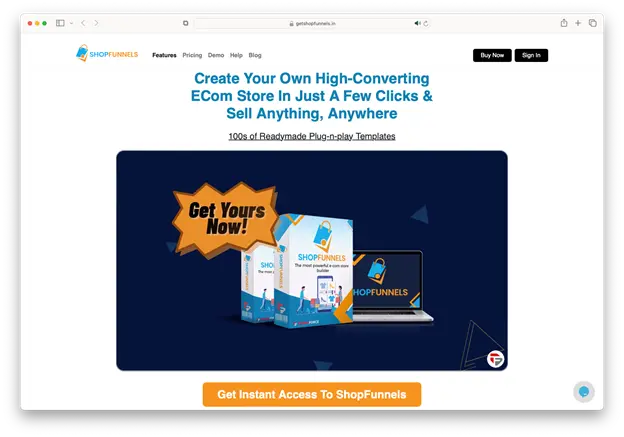
Why It Stands Out:
ShopFunnels is built for businesses that need an all-in-one platform to create and manage their online stores. With a focus on flexibility and growth, it’s ideal for companies aiming to expand quickly.
What makes it special? It’s highly adaptable and works smoothly with any hosting service, including WordPress.
Key Features:
- Advanced customer segmentation options
- AI-powered tools for optimizing sales funnels
- Easy-to-use drag-and-drop builder
- Integration with CRM systems
- Around-the-clock support
- Real-time analytics dashboard
Best For:
Tech-savvy businesses looking to maximize conversion rates and streamline their sales process.
2. BigCommerce
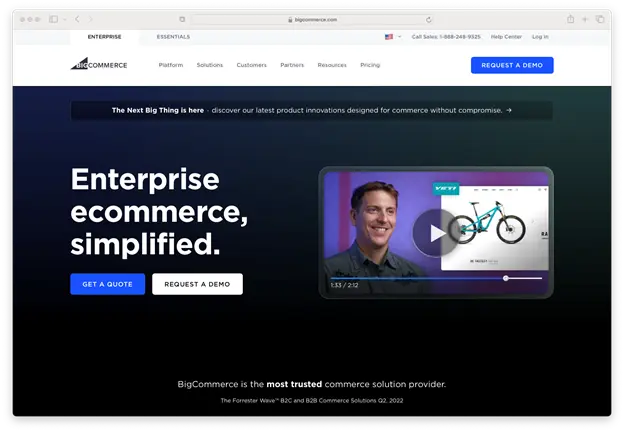
Why It Stands Out:
BigCommerce is a powerful platform that has gained praise in the B2B e-commerce market. Its B2B Edition is specifically tailored to meet the needs of B2B businesses, offering features like bulk pricing, personalized catalogs for different customers, and advanced payment options.
Key Features:
- Strong API functionality
- Advanced tools for SEO
- Ability to sell across multiple channels
- Customizable checkout
- Comprehensive features tailored to B2B businesses
Best For:
Mid- to large-sized businesses with complex product catalogs and multiple customer groups.
3. Magento Commerce

Why It Stands Out:
Magento is well-known for its highly flexible platform, capable of managing complex B2B transactions. It offers both an open-source version for smaller businesses and an enterprise version for larger companies, making it suitable for a wide range of needs.
Key Features:
- Wide range of third-party integrations
- Advanced B2B tools
- Flexible API options
- Strong security measures
- Content staging and preview capabilities
Best For:
Businesses that need highly tailored e-commerce solutions and have skilled in-house development teams.
4. Shopify
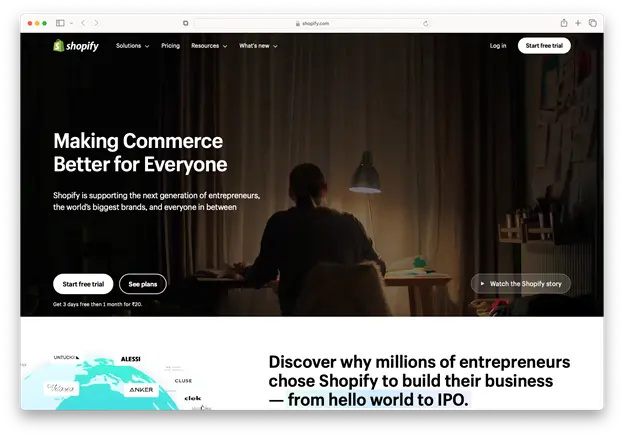
Why It Stands Out:
Shopify Plus combines an easy-to-use interface with powerful enterprise-level features. Known for its versatility and simplicity, Shopify is a popular choice. Its B2B capabilities include bulk pricing, customer segmentation, and compatibility with various third-party apps.
Key Features:
- Automated workflows
- Simple setup process
- Strong customer support
- Wholesale channel management
- Global selling options
Best For:
Rapidly growing B2B businesses looking for a platform that balances ease of use with advanced features.
5. Oracle Commerce

Why It Stands Out:
Oracle Commerce is designed for large enterprises that require a solid and expandable solution. Oracle’s NetSuite SuiteCommerce is an enterprise-level platform designed to provide personalized and smooth experiences for both B2B and B2C businesses.
Key Features:
- AI-powered personalization
- Support for omnichannel commerce
- Customized customer support
- Complex pricing structures
- Secure inventory management
Best For:
Large enterprises with complex business requirements and a high volume of transactions.
6. Salesforce Commerce Cloud
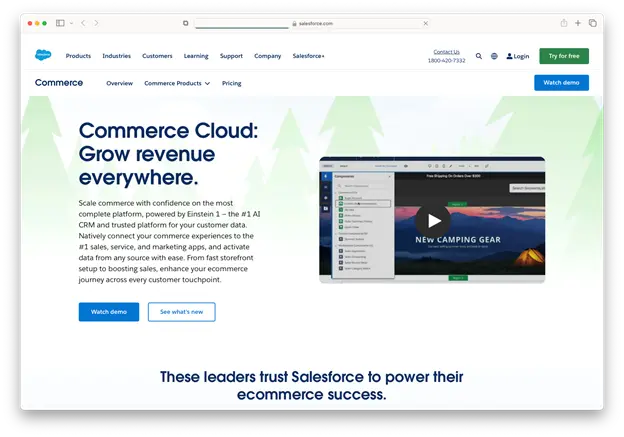
Why It Stands Out:
Salesforce Commerce Cloud is known for offering a unified shopping experience across multiple channels. It works seamlessly with the larger Salesforce ecosystem, making it an ideal option for businesses that already use Salesforce CRM. Its strength lies in delivering personalized experiences on a large scale.
Key Features:
- AI-driven personalization
- Advanced order management
- Smooth integration with CRM
- Cloud-based scalability
Best For:
B2B businesses in need of a comprehensive solution that combines commerce and CRM functionality.
7. WooCommerce
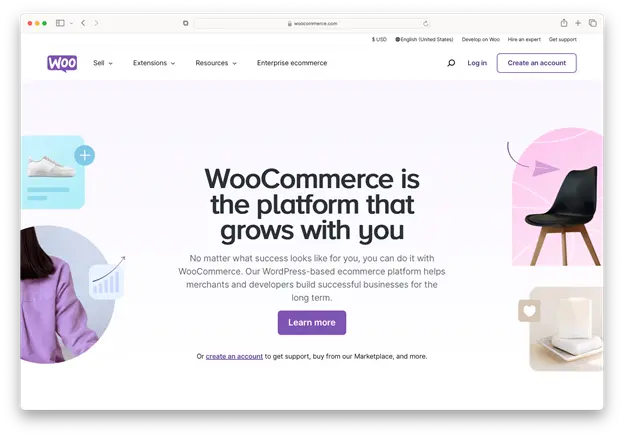
Why It Stands Out:
WooCommerce offers a cost-effective and flexible solution for WordPress-based businesses. It is the go-to platform for businesses using WordPress. Its flexibility and ease of blending make it a popular choice for businesses that want control over their website design and functionality.
Key Features:
- Wide range of plugins
- Customizable checkout
- Large plugin library
- Simple integration with WordPress
- Various payment options
Best For:
Small to medium-sized B2B businesses that are already on WordPress or need an affordable solution.
8. OroCommerce
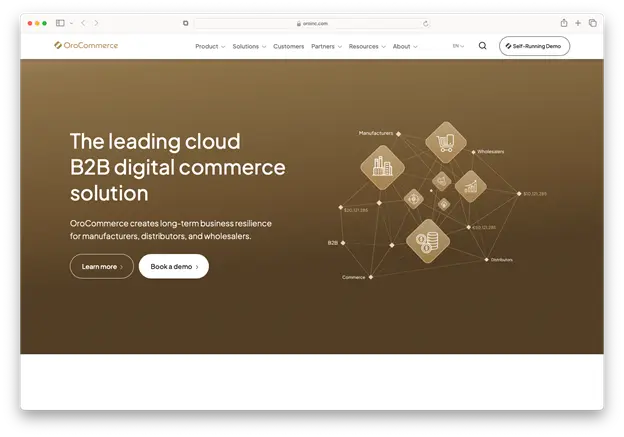
Why It Stands Out:
OroCommerce is a specialized B2B e-commerce platform designed to handle the complexities of B2B transactions. It includes features tailored for B2B businesses, such as support for multiple sales channels, automated workflows, and strong CRM integration.
Key Features:
- Management of corporate accounts
- Advanced pricing options
- Multiple pricing lists and catalogs
- Powerful workflow automation
- Integration with ERP systems
Best For:
B2B manufacturers, distributors, and wholesalers need industry-specific features.
9. Intershop

Why It Stands Out:
Intershop is known for its enterprise-level e-commerce solutions that cater to both B2B and B2C markets. Intershop is designed for large enterprises with complex requirements and high transaction volumes, offering the flexibility and power needed for both business-to-business and business-to-consumer operations.
Key Features:
- Multi-touchpoint setup
- Advanced product information management
- Flexible pricing and promotion tools
- Strong B2B capabilities
- Omnichannel support
Best For:
Large B2B organizations with complex product setups and pricing structures.
10. PrestaShop

Why It Stands Out:
PrestaShop offers an open-source, user-friendly platform with robust community support. It’s a great choice for businesses that need a customizable e-commerce solution without high costs.
Key Features:
- Support for multiple languages and currencies
- Fast setup and easy deployment
- Large collection of add-ons
- Flexible open-source system
- Wide range of available modules
Best For:
Small to medium-sized B2B businesses seeking an affordable and customizable e-commerce platform.
11. VTEX

Why It Stands Out:
VTEX offers a comprehensive, cloud-based solution for global B2B commerce. It provides a unified commerce experience across all channels and combines strong B2B features with powerful B2C capabilities.
Key Features:
- Headless and flexible architecture
- Built-in marketplace features
- Advanced order management system
- Strong B2B functionalities
Best For:
B2B businesses looking to quickly expand globally and those wanting to start their marketplaces.
12. NetSuite SuiteCommerce

Why It Stands Out:
NetSuite SuiteCommerce offers an all-in-one business management solution that combines ERP, CRM, and e-commerce features. This integration helps businesses streamline their operations, get a clear view of customer data, and manage everything from one platform.
Key Features:
- Inventory management
- Order processing
- Financial management
- Customer relationship management
Best For:
Businesses need a single platform to manage all their operations efficiently.
Advantages of Using B2B E-commerce Platforms
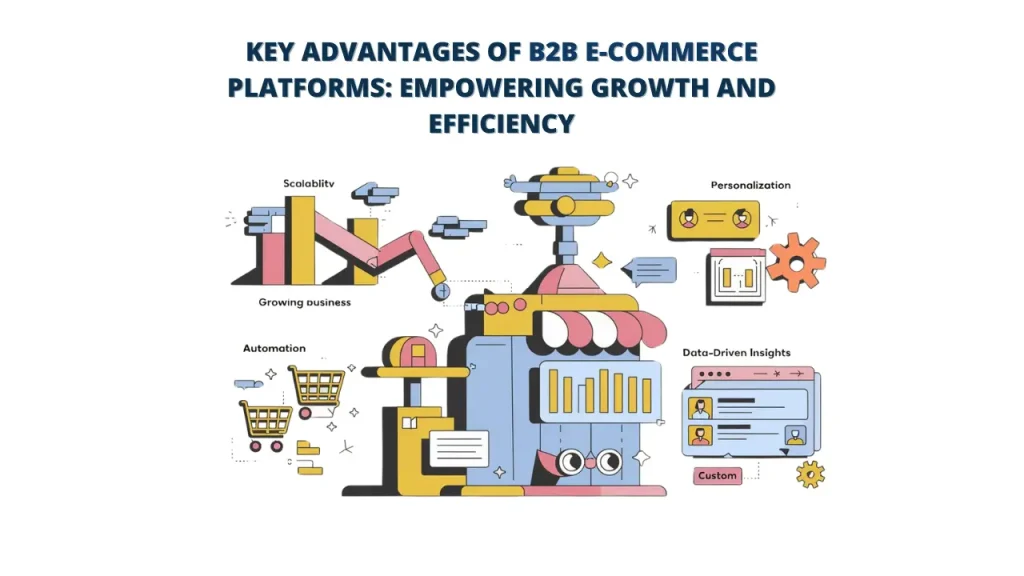
B2B e-commerce platforms offer several important benefits that can help businesses grow:
A. Scalability
These platforms make it easy to handle more transactions as your business grows, allowing for smooth expansion. ShopFunnels enables you to develop a user-friendly, no-code it will surely assist you efficiently.
B. Personalization
B2B platforms offer tailored shopping experiences, which are key to keeping customers happy and building lasting business relationships.
C. Automation
Automating tasks such as processing orders and managing inventory on B2B platforms helps reduce mistakes and lower costs. Customers who leave items in their cart can benefit from automated cart reminders, which ShopFunnels provides.
D. Data-Driven Insights
With advanced analytics, businesses can make better decisions and expand into new markets with ease.
E. Customer Relationship Management (CRM)
Many B2B platforms come with integrated CRM tools to help businesses manage and improve their customer relationships. ShopFunnels provides essential features such as custom checkouts, coupon creation, and powerful built-in analytics.
Considerations for Choosing a B2B E-Commerce Platform
A. Business Size and Needs
- Assess your current transaction volume and expected future growth.
- Think about how complex your product catalog and pricing are.
- Determine if you need features like quote management, bulk ordering, and account hierarchies.
As you notice, ShopFunnels provides a simple solution where you can easily create coupons and discount codes. It also offers ready-made widgets that make setting up your e-commerce store quicker and easier.
B. Integration with Existing Systems
- Make sure the platform works well with your existing ERP, CRM, and inventory management systems.
- Choose platforms with strong API support for smooth data integration.
- Check if it easily connects with your preferred payment gateways and shipping services.
C. Customization and Scalability
- Choose platforms that allow flexibility in design and features.
- Ensure the platform can handle more traffic as your business grows.
- Look for systems with modular designs that let you add features as your business needs change.
If you require features such as these, you can choose Shopfunnels, which includes a fully customizable shopping cart and Response web design.
Conclusion
Choosing the right B2B e-commerce platform is a key decision that can significantly boost your business’s success. The platforms you’ve covered each offer unique features designed to meet various business needs and sizes. From ShopFunnels’ AI-powered tools to Oracle Commerce’s enterprise-grade solutions, there’s a platform suited for every B2B company aiming to excel in the online market.
Remember, the best choice depends on your business’s specific needs, growth goals, and technical setup. With ShopFunnels, for example, you’ll benefit from an intuitive page editor and the freedom to choose your payment system, allowing you to build a fantastic site with ease. Plus, there are no limits on the number of products you can add.
Don’t hesitate to explore demos or trials from these providers. The right B2B e-commerce platform is out there, ready to transform your business and drive significant growth in 2024 and beyond.
FAQs about the Best B2B E-commerce Websites
Q: How do I select the right B2B e-commerce platform for my business?
Ans. To choose the best B2B e-commerce platform, think about your business size, operational needs, how well it integrates with your existing systems (like ERP and CRM), and the level of customization and scalability you require. You can also use ShopFunnels for easy order and shipping management.
Q: What are the main benefits of using a B2B e-commerce platform?
Ans. Top B2B e-commerce platforms 2024 make operations smoother by automating tasks such as ordering, payments, and logistics. They also help businesses reach a global audience, manage complex customer relationships, and enhance customer service with built-in CRM tools.
Q: What kind of customer support can I expect from B2B e-commerce platforms?
Ans. Customer support differs across platforms. Larger platforms like ShopFunnels and Oracle Commerce often provide dedicated account management and 24/7 support. Smaller platforms may offer community support, knowledge bases, or tiered support options depending on your subscription.
Q: Can B2B e-commerce platforms be customized?
Ans. Yes, most B2B e-commerce platforms offer different levels of customization. Platforms like ShopFunnels and OroCommerce are particularly known for their extensive customization options.

